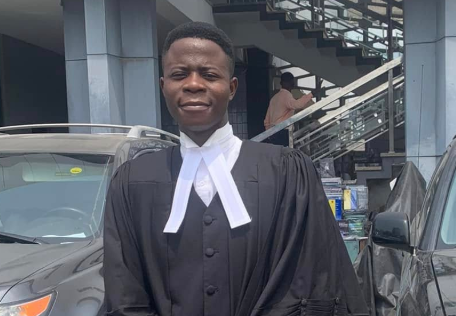
Lawyer Drags Gov. Sanwo-Olu to Court for Blocking Him on X in Landmark Free Speech Battle

In a case that has quickly captured public attention and sparked heated debates on the limits of free speech and the powers of public officials in the digital space, a Lagos-based lawyer has filed a lawsuit against Governor Babajide Sanwo-Olu of Lagos State after being blocked on the social media platform X (formerly Twitter). The suit, which was filed at the Federal High Court in Lagos, has been described by legal analysts as not just a personal grievance but a potential landmark case that could reshape how political leaders in Nigeria engage with citizens on social media platforms. According to court documents made available, the lawyer alleges that the Governor’s decision to block him constitutes a violation of his fundamental right to freedom of expression as guaranteed under the Nigerian Constitution, particularly Section 39 which protects the right to freedom of expression, including the freedom to receive and impart ideas and information without interference. The lawyer insists that as a public official who uses his X account to disseminate policies, governmental decisions, and official announcements, the Governor has effectively turned his page into a public forum, and therefore blocking citizens who express dissenting views is unlawful, undemocratic, and a breach of constitutional provisions.
The suit has generated a storm of reactions across social media, with many Nigerians divided on the issue. Some argue that the Governor, like any other individual, has the right to determine who can or cannot interact with his personal page, pointing out that social media accounts are ultimately controlled by the user regardless of status. Others, however, maintain that the Governor’s account, being used as a tool of governance and public communication, falls under a different standard that prevents arbitrary blocking of citizens. For many, this case has reignited conversations around digital rights and the responsibilities of elected leaders in a country where social media has become an indispensable avenue for political engagement, activism, and civic participation.
The lawyer, in his affidavit, claims that being blocked by the Governor has limited his access to vital information about governance and public interest matters in Lagos State, arguing that the Governor frequently posts official announcements, policy directions, and emergency information through his X account. He contends that barring citizens from accessing such information amounts to excluding them from the democratic process, especially since government communication increasingly relies on digital platforms. He also insists that blocking critics on social media represents an attempt to suppress dissent and silence alternative viewpoints, something he believes is incompatible with democratic values and constitutional rights.
Observers have quickly drawn parallels between this case and similar lawsuits in other parts of the world, most notably in the United States where former President Donald Trump faced legal challenges after blocking critics on Twitter. In that case, a U.S. federal appeals court ruled that Trump’s actions were unconstitutional because his account functioned as a public forum for government communication. Although that ruling was later vacated by the U.S. Supreme Court for procedural reasons, it left behind a powerful precedent that has been widely debated. Nigerian legal experts say this lawsuit against Governor Sanwo-Olu may follow a similar trajectory, potentially setting a precedent for how government officials in Nigeria interact with the public on digital platforms.
Political commentators note that the case comes at a particularly tense moment for Lagos politics, with Sanwo-Olu’s administration facing scrutiny over various governance issues, ranging from infrastructural challenges and urban planning controversies to the lingering public distrust that emerged after the #EndSARS protests of 2020. Social media has become a critical space where citizens confront, question, and challenge government actions, and many see the Governor’s alleged blocking of critics as an attempt to control narratives and shield himself from accountability. On the other hand, loyalists of the Governor have dismissed the lawsuit as frivolous and politically motivated, accusing the lawyer of seeking cheap publicity at the expense of the Governor’s reputation. Some of the Governor’s supporters argue that social media is often toxic, with abusive comments and unverified allegations flying around, and that no public official should be forced to endure harassment online under the guise of free speech.
Nevertheless, the lawsuit has stirred interest beyond Lagos, with digital rights activists, civil society groups, and human rights organizations closely monitoring developments. Groups advocating for freedom of expression have praised the lawyer’s decision to challenge the Governor, describing it as a bold step that could advance Nigeria’s democratic practices in the digital era. They argue that leaders must be open to criticism and accountability, and that public forums, whether physical or digital, cannot be restricted by personal discretion when used for governance. One digital rights advocate noted that “when a Governor uses his X account to communicate government policies, security alerts, and official matters, it stops being just a personal account—it becomes a public utility, and no citizen should be denied access to it.”
The Federal High Court is yet to fix a hearing date for the case, but the matter has already triggered legal debates in academic and professional circles. Some constitutional lawyers believe the case will test the boundaries of Section 39 of the Nigerian Constitution and could provide judicial clarity on whether social media accounts of public officials fall under public institutions for the purpose of enforcing fundamental rights. Others remain skeptical, warning that the courts may be reluctant to interfere in what could be framed as a personal choice by the Governor.
On the streets of Lagos, the story has found resonance among young people who are avid users of social media. Many youths, who form the bulk of Nigeria’s online community, see the case as a symbolic battle for digital freedom and inclusion. For them, the Governor’s alleged action represents a broader trend of government intolerance toward criticism, and the court case provides an opportunity to push back. Across X, hashtags related to the lawsuit have begun trending, with users mocking the Governor for being unable to handle criticism while others commend the lawyer for daring to take on political authority.
Whatever the eventual outcome, it is clear that this case has already succeeded in igniting conversations about free speech, digital rights, and political accountability in Nigeria. It underscores the growing importance of social media as a battleground for democracy, where ordinary citizens can demand transparency and challenge power. For Governor Sanwo-Olu, the case represents a delicate situation that may either affirm his openness to democratic principles or cast him as a leader uncomfortable with dissent. For the Nigerian judiciary, it offers a rare chance to make history by defining how constitutional rights extend into the digital world.
As the legal drama unfolds, one thing remains certain: this lawsuit is about more than just a lawyer being blocked on X—it is about the future of free speech, the digital public square, and the evolving relationship between citizens and their leaders in the twenty-first century. The case may well determine whether Nigerian democracy will adapt to the realities of the digital age or remain bound to outdated interpretations of constitutional freedoms.


